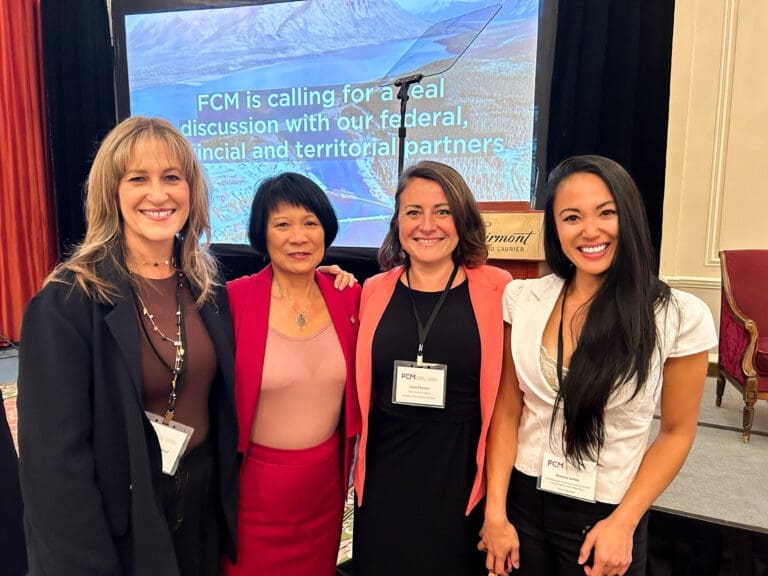Cities like Brampton are growing exponentially and we are increasingly expected to pay for that growth through limited sources of revenue, more specifically property taxes, as legislated by other orders of government who also set our growth targets. Local governments are being pushed to the limit, tasked with maintaining more than 60% of public infrastructure with less than 10 cents for every tax dollar collected. Growing cities like Brampton are maintaining an increasing share of public infrastructure, after decades upon decades of downloads from other orders of government but expected to pay for it all with only 10% of total taxes collected. How does that make sense?
Further shocking is that we are operating on a funding model for municipalities which has not been updated since 1867. Yes, that’s over 150 years ago. Consider that Alexander Bell invented the telephone in 1876. Sadly, municipalities have had to pay for growth and continue to do so based on a financial model implemented (and never changed) since before the invention of the telephone.
This outdated financial model for municipalities is being stretched thin to build and fund frontline services, roads, bridges, parks, recreation centres, public buildings, water treatment, waste collection, seasonal maintenance, municipal planning and administration, police, fire, public health, and much more—essentially, everything we deliver as local governments daily. This doesn’t even include the unexpected costs related to local responses to emergencies like flooding or a global pandemic. We are expected to deliver these changing and growing services in the 21st century based on funding models developed in the 19th century.
Local leaders are charting a path forward for change. The Federation of Canadian Municipalities’ (FCM) representing over 2,000 municipalities across the country is calling for national discussions around a new Municipal Growth Framework – one that will link local resources to national dynamics such as population and economic growth and prioritizes the communities we serve. Brampton Council most recently passed a motion to support FCM’s efforts in developing and advocating for a new Municipal Growth Framework
Canada has just surpassed 40 million people. Growth is a good thing. We need this growth as a country and as a city to remain competitive in global and domestic markets. But our communities must be ready for it. Brampton, like many other municipalities are struggling with this growth. As one of Canada’s fastest growing big cities with a housing target of 113,000 units in 8 years, Brampton is significantly impacted by the lack of financial tools to pay for its growth and inextricably related services, of which we have already been chronically underfunded for.
We face major challenges, like housing and homelessness, healthcare and mental health, replacing core infrastructure and making our communities less vulnerable to climate change, all of which are increasingly drawing on municipal resources, with property taxes being the predominant revenue source.
Here are a few examples of this underfunding:
-
- Upon dissolution of Peel Region it is calculated that building a new waste-water treatment plant is estimated at upwards of $1.2 billion alone.
- The Federal and Provincial government are pushing cities to allow for more conversions of Additional Residential Units (ARUs) to help address the housing crisis. Over the past 5 years, Brampton has already seen a proliferation of legal and illegal ARUs in its local neighbourhoods. While we are mitigating some of the issues through a “Residential Rental Licensing” program, there is an increased cost in servicing multi-unit dwellings which were originally calculated to service a smaller number of residents.
- Brampton still only has ONE hospital serving 700,000 residents. While healthcare is a provincial responsibility, through changed legislation, municipalities are required to contribute 10% of capital costs towards building new hospitals. This shows up in the form of increasing property taxes.
Over the coming months, the City of Brampton will be working alongside FCM to engage with provincial and federal orders of government, and to push for a frank discussion on what a new Municipal Growth Framework could look like for communities across the country. This conversation must lead to an improvement in the quality of life of all residents. Regardless of what order of government; federal, provincial or municipal, we serve the same residents.
Imagine the year is 2030, 2040, or even 2050. Our community feels safer and has the infrastructure and services we need, renting or buying a home is more affordable and we’re fully prepared for the next extreme weather event. We’re spending less time waiting in the emergency room, in traffic, or negotiating potholes and dealing with flooding and more time thinking about the future alongside our friends and neighbours. We can rely on dependable local services and infrastructure to support our local economy and businesses, and to be used by our children as they grow. We are striving to achieve this vision for Brampton, just like other municipalities across the country. But it is a significant challenge for municipalities to plan, build and service growth in the present and the future based on a centuries old finance model, prescribed in the 1800s.
If we are expected to build and service for the present and the future, is it unreasonable for municipalities to ask that our financial tools also be updated accordingly? Let’s make sure Canada’s growth is a story of success in our communities from coast to coast to coast, and that local leaders have the right tools to build a better future for all Canadians.
About the Author
Rowena Santos is a Regional Councillor for the City of Brampton / Region of Peel. She sits as Brampton’s representative on the Board for FCM, and Chair of its Committee of Municipal Finance, Infrastructure and Transportation. Read More.











